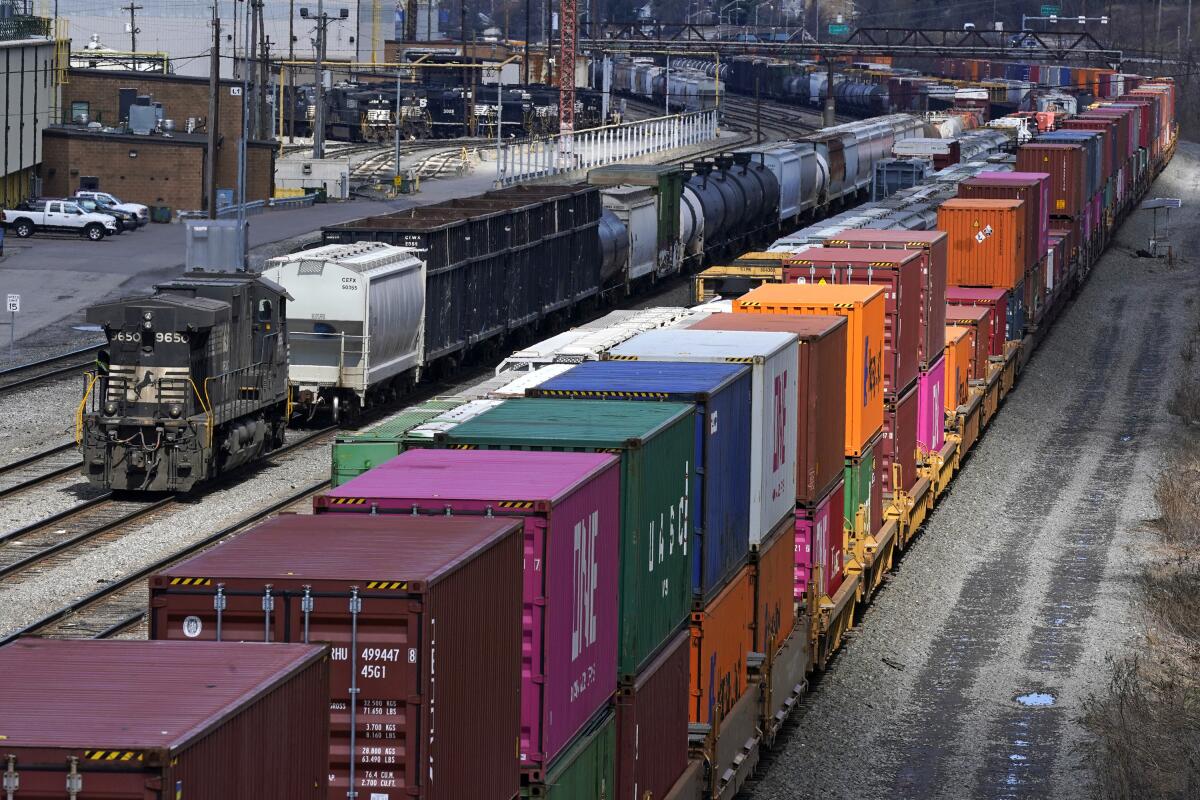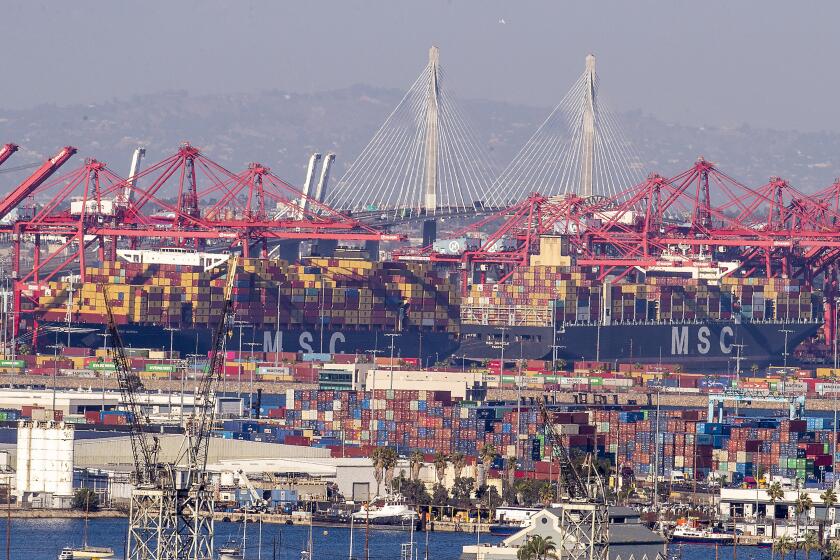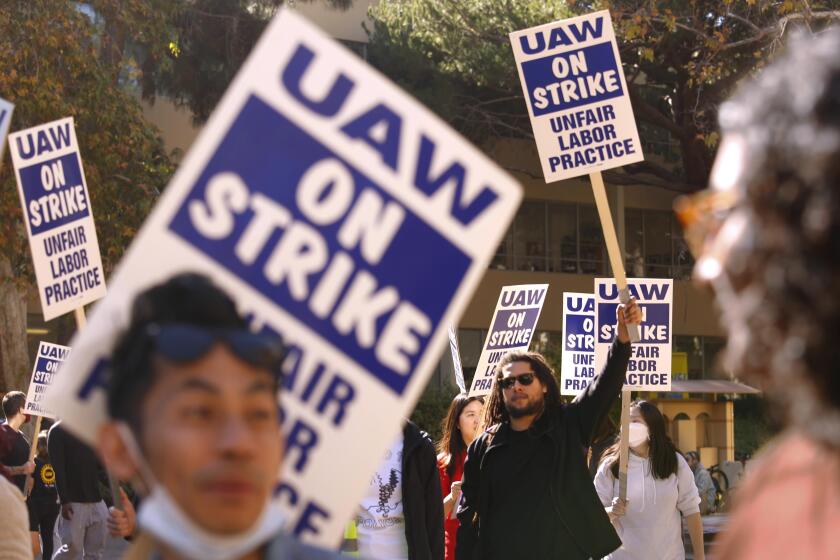Big rail unions split on contract deal with railroads, raising possibility of a strike

- Share via
OMAHA — Railroad engineers accepted a deal with the railroads Monday that would deliver 24% raises, but conductors rejected their proposed agreement, threatening the health of the U.S. economy just before the holidays and casting more doubt on whether the industry will be able to resolve the labor dispute before next month’s deadline without the help of Congress.
Even the threat of a work stoppage could tangle the nation’s supply chains, because railroads could freeze shipments of chemicals and other goods that could create hazards if their delivery is stalled.
The split vote Monday from the two biggest railroad unions follows the rejection by three other unions of their deals with the railroads, which the Biden administration helped broker before the original strike deadline in September. Seven smaller unions have approved the five-year deal that, on top of the 24% raise, includes a $5,000 bonus.
Many union members have voted to reject the contracts because they say they fail to address demanding schedules and quality-of-life issues for employees.
All 12 unions must approve the contracts to prevent a strike that could cripple supply chains and hamper a stressed U.S. economy still recovering from the COVID-19 pandemic.
The Retail Industry Leaders Assn., which represents more than 200 major retailers, said a rail strike “would cause enormous disruption to the flow of goods nationwide,” although retail stores are well-stocked for the crucial holiday shopping season.
A startup called Unit of Work is helping workers form independent unions, with backing from an unlikely source. The mission is to reverse the long-term decline of organized labor in the U.S.
“Fortunately, this year’s holiday gifts have already landed on store shelves,” said the association’s Jess Dankert. “But an interruption to rail transportation does pose a significant challenge to getting items like perishable food products and e-commerce shipments delivered on time, and it will undoubtedly add to the inflationary pressures already hitting the U.S. economy.”
The unions that rejected their deals agreed to return to the bargaining table to try to hash out a new agreement before a new strike deadline early next month. Those talks have deadlocked because the railroads refuse to consider adding paid sick time to what was already offered.
It appears increasingly likely that Congress will have to step in to settle the dispute. Lawmakers have the power to impose contract terms if both sides can’t reach an agreement. Hundreds of business groups have urged Congress to be ready to intervene if needed.
Workers frustrated with the demanding schedules and deep job cuts in the industry pushed to reject these contracts because they don’t resolve workers’ key quality-of-life concerns. The deals for the engineers and conductors did include a promise to try to improve the scheduling of regular days off and negotiate the details of those schedules further at each railroad. The unions that represent engineers and conductors also received three unpaid days off a year to tend to medical needs as long as those days are scheduled at least 30 days in advance.
The ILWU, the union representing dockworkers across the West Coast, is at the bargaining table with the PMA, the group representing shipping companies. The current contract expires on July 1.
The railroads lost out on their bid to cut crew sizes down to one person as part of the negotiations. But the conductors in the Transportation Division of the International Assn. of Sheet Metal, Air, Rail and Transportation Workers union, or SMART-TD, still narrowly rejected the deal, with roughly 51% voting against it. A smaller subdivision of the SMART-TD that represents about 1,300 yardmasters did approve the deal.
“The ball is now in the railroads’ court. Let’s see what they do. They can settle this at the bargaining table,” SMART-TD President Jeremy Ferguson said. “But the railroad executives who constantly complain about government interference and regularly bad-mouth regulators and Congress now want Congress to do the bargaining for them.”
The railroads maintain that the deals with the unions should closely follow the recommendations made this summer by a special panel of arbitrators President Biden appointed. That’s part of the reason why they don’t want to offer paid sick time. Plus, the railroads say the unions have agreed over the years to forgo paid sick time in favor of higher pay and strong short-term disability benefits.
The unions say that it is long overdue for the railroads to offer paid sick time to workers and that the pandemic highlighted the need for it.
The union said the two sides remained far apart on compensation, a major sticking point, as the work stoppage by 48,000 academic workers went into Day 4.
The group negotiating on behalf of the railroads said Monday that the unions voting against their deals shouldn’t expect to receive more than the Presidential Emergency Board of arbitrators recommended. The National Carriers Conference Committee said businesses could start to be affected by the threat of a strike even before the deadline.
“A national rail strike would severely impact the economy and the public. Now, the continued, near-term threat of one will require that freight railroads and passenger carriers soon begin to take responsible steps to safely secure the network in advance of any deadline,” the railroads said.
It’s unclear what Congress might do, given the deep political divisions in Washington and the fact that a single lawmaker could hold up a resolution. But the head of the Assn. of American Railroads trade group, Ian Jefferies, said that “if the remaining unions do not accept an agreement, Congress should be prepared to act and avoid a disastrous $2-billion-a-day hit to our economy.”
Republicans may try to impose a deal that includes only what the Presidential Emergency Board recommended, while Democrats who still narrowly hold control of both the House and Senate during this lame-duck period might be willing to force the railroads to make additional concessions.
The unions that voted Monday represent more than half of the roughly 115,000 rail workers involved in the contract dispute with Union Pacific, Norfolk Southern, BNSF, Kansas City Southern, CSX and other railroads.
More to Read
Sign up for Essential California
The most important California stories and recommendations in your inbox every morning.
You may occasionally receive promotional content from the Los Angeles Times.
















